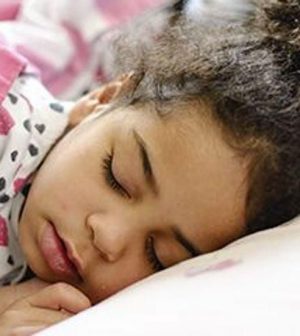- Recognizing the Signs of Hypothyroidism
- 10 Strategies to Overcome Insomnia
- Could Artificial Sweeteners Be Aging the Brain Faster?
- Techniques for Soothing Your Nervous System
- Does the Water in Your House Smell Funny? Here’s Why
- Can a Daily Dose of Apple Cider Vinegar Actually Aid Weight Loss?
- 6 Health Beverages That Can Actually Spike Your Blood Sugar
- Treatment Options for Social Anxiety Disorder
- Understanding the Connection Between Anxiety and Depression
- How Daily Prunes Can Influence Cholesterol and Inflammation
Even Young Children Can Have Breathing Issues During Sleep

It’s important for parents to recognize when kids have breathing problems during sleep and to seek medical help, an expert says.
“During sleep, the muscles keeping the upper airway stiff relax, and as a consequence, the airway narrows, which can cause snoring, snorting or in severe cases, the complete obstruction of the airway,” said Kurt Lushington, a sleep researcher at the University of South Australia.
Known as sleep-disordered breathing, this can lead to daytime sleepiness, irritability, hyperactivity and poor attention, potentially affecting performance in school, he said.
While the long-term effects are not well understood, Lushington said research suggests sleep-disordered breathing could also impair heart and metabolic health.
“Sleep-disordered breathing is significantly undiagnosed in the community,” he noted in a university news release. “Parents can play an important role in the diagnostic process by looking out for the common symptoms, which include heavy breathing, snoring, gasping, or snorting, and stopping breathing altogether — and then share that information with their child’s doctor.”
Lushington’s team surveyed parents of more than 1,600 kids in South Australia and found that nearly all of those whose kids had symptoms considered apnea a problem. Nearly two-thirds of parents viewed snorting and gasping as a problem.
About half regarded snoring as a problem and a third considered breathing heavily but not snoring an issue.
But most parents don’t share these concerns with their child’s health care providers, the survey revealed.
“While there does need to be more education for parents on symptoms of sleep-disordered breathing — particularly around snoring or heavy breathing being a potential cause for concern, there are clearly other barriers to parents bringing up sleep problems in medical consultations,” Lushington said.
“To address this, we suggest medical practitioners need to purposely include questions about sleep at consultations to prompt parents to discuss any symptoms they may have observed in their children at night,” he added.
More information
The American Academy of Pediatrics has more on sleep apnea.
SOURCE: University of South Australia, news release, July 19, 2021
Source: HealthDay
Copyright © 2026 HealthDay. All rights reserved.










